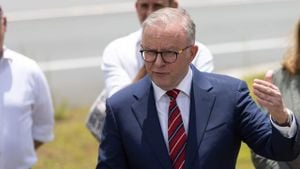Isabella Tovaglieri, an Italian Member of the European Parliament representing the Lega party, has issued strong critiques against the European Union, labeling it as geopolitically irrelevant. Her comments come as EU's role is repeatedly questioned on international matters, particularly concerning major conflicts such as the war in Ukraine.
During her recent remarks in Brussels, Tovaglieri asserted, "L'Unione Europea si è dimostrata più volte irrilevante sui temi geopolitici e la dimostrazione è che siamo stati esclusi da tutti i tavoli fondamentali in cui si poteva intavolare un negoziato di pace sull'Ucraina," which translates to: "The European Union has repeatedly proven to be irrelevant on geopolitical issues, as evidenced by our exclusion from all the key tables where peace negotiations on Ukraine could have taken place." This statement highlights her concerns about the EU's failing involvement in pivotal discussions.
Tovaglieri's remarks resonate with broader skepticism surrounding the EU's influence on the global stage. Critics argue the bloc's bureaucratic nature often hinders swift and strategic responses to urgent geopolitical crises. The absence of the EU from significant peace talks, especially amid the conflict stemming from Russia's invasion of Ukraine, raises questions about its diplomatic efficacy.
The EU's diplomatic endeavors, particularly through its foreign policy arm, have come under fire for not proactively engaging with key players involved in the Ukraine conflict. Tovaglieri's comments suggest not only frustration but also highlight the growing discontent among some member states about the bloc's current geopolitical strategies.
Historically, the EU has aimed to position itself as a stabilizing factor within international relations, championing diplomacy and multilateralism. Nevertheless, Tovaglieri’s perspective showcases the challenges faced by the EU as it navigates between its inherent bureaucratic processes and the fast-paced requirements of modern geopolitics.
The calls for the EU to rethink its strategic capacities are becoming louder, urging it to facilitate dialogue and negotiations more effectively. Tovaglieri's critique serves as both a reflection of the frustrations held by certain political factions and as a larger commentary on the EU's need to adapt to the changing dynamics of global power.
Looking forward, the EU faces the momentous task of either revitalizing its global presence or risk falling out of the influential role it has sought. Tovaglieri’s statement could represent the tipping point needed for EU leadership to reassess its diplomatic policies and engagement strategies. The effectiveness of the EU on the world stage might hinge on how it addresses these pressing criticisms, especially as instability continues to brew across various global hotspots.
Without re-engaging with significant geopolitical issues, especially those impacting its own borders like the Ukrainian crisis, the EU could find itself increasingly sidelined. Tovaglieri’s remarks are timely, echoing the sentiments of many who believe it is high time for the European Union to recalibrate its approach to foreign policy, solidifying its role not just as a regional actor, but as an influential global presence.



